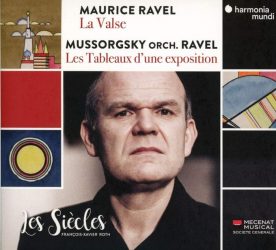Classical CD Reviews: François-Xavier Roth conducts Mussorgsky and Ravel, Manfred Honeck conducts Tchaikovsky and Leshnoff, and Mikolajus Čiurlionis Orchestral Works
By Jonathan Blumhofer
François-Xavier Roth and his period ensemble Les Siècles serve up freshness of playing and conviction of interpretation; Manfred Honeck is one of that rare breed of artist: a conductor who can draw compelling, electrifying accounts of the standard canon as if on cue; the verdict’s mixed on the music of Lithuanian-born composer Mikalojus Čiurlionis.

François-Xavier Roth and his period ensemble Les Siècles continue to turn their attention to some early-20th-century fare with their latest release. This new disc pairs Ravel’s orchestration of Modest Mussorgsky’s Pictures at an Exhibition with his “choreographic essay” La valse. It’s a short pairing (just about forty-five minutes long) but well played and inviting, if not among the group’s most daring.
Best is a focused, flatly unsentimental account of La valse that marries a robust realization of Ravel’s sumptuous instrumentation with a stirring clarity of texture. Throughout, the score’s low voices always speak; the concluding peroration is wild and turbulent.
The Mussorgsky orchestration that precedes La valse is, similarly, marked by a strong sense of atmosphere and sonic character. The string glissandos and portamenti in “Gnomus” are discreetly done. Likewise, the saxophone solo in “Il Vecchio Castello” is soulfully executed, while the larger movement is marked by a wonderful attention to dynamic details. Meanwhile, “Bydlo” features a grand account of the tuba solo, the “Ballet des poussins” prims with pluck, and “Catacombs” glows brashly.
Roth’s approach to the piece makes engaging sense of Pictures’ narrative architecture: the stirring “Great Gate at Kiev” ties everything up majestically, but his command of the musical line is present in each of the “Promenades” as well as the gossamer reading of “Tuileries,” snappy “Limoges,” and play of heat and cold in “Cum mortuis.”
Indeed: for freshness of playing and conviction of interpretation, this is a fine – if brief – album, and a conspicuously well-engineered one, at that.

Manfred Honeck is one of that rare breed of artist: a conductor who can draw compelling, electrifying accounts of the standard canon as if on cue. His latest release, which pairs Tchaikovsky’s Symphony no. 4 with Jonathan Leshnoff’s Double Concerto for Clarinet and Bassoon, manages this feat again.
Honeck’s reading is marked by a commanding sense of instrumental color and structural shape in both of the Symphony’s first two movements. The playing of the Pittsburgh Symphony Orchestra (PSO) – which seems always at its considerable best for its music director – is closely attuned to the music’s rhythmic and dynamic impulses. In the big opening movement, there’s a gripping sense of urgency to the various iterations of the “Fate” tattoo, among other things, while the slow second is lush and smartly directed.
In the third, Honeck drives the tempo briskly (but never too hard) and the transition between the scherzo and trio is subtly managed. So are the contrasts of dynamics in that movement’s recapitulation – an accomplishment that’s then repeated in the Pittsburgher’s exhilarating account of the Symphony’s finale. Throughout, the orchestra’s playing is electric and well-balanced.
Similar qualities mark Leshnoff’s Double Concerto. The first of its three movements alternates spacious orchestral sonorities with engaging dialogues between the soloists and an always-discreet orchestral accompaniment. A shadowy, off-kilter middle movement conjures the shadow of Shostakovich while the athletic finale is clouded, here and there, by subdued textures and ambiguous melodic phrases.
In all, it’s a fetching piece, one that shows off both solo instruments exceedingly well, and is highlighted by engaging orchestral writing, to boot. Clarinetist Michael Rusinek and bassoonist Nancy Goeres (respective PSO principals) imbue their solo lines with a naturalness and chemistry that’s thoroughly involving.
In the end, Leshnoff’s Double Concerto doesn’t pretend to be anything it’s not – smart music, precisely written, technically assured – and it fits right in with the Strauss Duo-Concertante (not to mention the larger Classical woodwind concerto tradition) accordingly.
 Don’t know the name Mikalojus Čiurlionis? You’re not alone: the Lithuanian-born composer died young (aged just thirty-five) in 1911 and his wider output has only recently been the focus of rehabilitation. Regarded as the foundational figure in Lithuanian orchestral music, three Čiurlionis works are highlighted on a new disc from the Lithuanian National Symphony Orchestra (LNSO) and conductor Mondestas Pitrenas.
Don’t know the name Mikalojus Čiurlionis? You’re not alone: the Lithuanian-born composer died young (aged just thirty-five) in 1911 and his wider output has only recently been the focus of rehabilitation. Regarded as the foundational figure in Lithuanian orchestral music, three Čiurlionis works are highlighted on a new disc from the Lithuanian National Symphony Orchestra (LNSO) and conductor Mondestas Pitrenas.
How well does the music live up to Čiurlionis’ reputation?
Well, the verdict’s mixed. To be sure, Čiurlionis had an ear for striking gestures. The two biggest pieces on this album – the tone poems In the Forest (1901-02) and The Sea (1903-07) – open with alluring figures: a lush, spacious arpeggio slowly unfolding outwards in the former; a delicate, shimmery depiction of a gentle seascape in the latter. Where they go from there, though, is less impressive.
In the Forest offers moments of ear-catching scoring (particularly in the form of exposed low-brass writing), as well as a clear conception of form. But, generally, it lacks strong enough contrasts of ideas and expressive moods; it’s thematic materials aren’t particularly memorable, either, even if spots anticipate Richard Strauss a bit (a prominent, descending scale motive perhaps hints at Eine Alpensinfonie).
In The Sea, things simply run long. Moments and gestures jump out: a falling fourth/fifth figure speaks consistently; a scene with blurry pedal effects (lots of glissandos among them) works very well; the score’s stormy climax offers energy in spades. But the last third meanders. Whenever a reprise of the opening subject works its way into the proceedings, you’re reminded just how strong that first idea was – and how little else that came afterwards lived up to it.
Perhaps that’s partly a result of the performance, which sometimes sounds a bit underpowered (the harp and solo violin get lost in the wellenspiel episode near The Sea’s end). Or maybe it’s a matter of the performing edition, in this case Čiurlionis complete, original score: the moral, arguably, is that the earlier edition, with its gratuitous cuts, makes for a more convincing piece.
By a good measure, the finest score in this collection is the shortest: the opening Kęstutis Overture. With its brooding introduction and blustery main body, the latter highlighted by a shapely and noble contrasting lyrical theme, it’s a piece that ought to be a repertoire staple.
Pitrenas leads the LNSO in performances that are consistently marked by fervency and energy – all of the album’s atmospheric touches are warmly colored, particularly the outer sections of In the Forest – even as, occasionally, the strings sound a touch thin in the selections’ more muscular passagework.
Jonathan Blumhofer is a composer and violist who has been active in the greater Boston area since 2004. His music has received numerous awards and been performed by various ensembles, including the American Composers Orchestra, Kiev Philharmonic, Camerata Chicago, Xanthos Ensemble, and Juventas New Music Group. Since receiving his doctorate from Boston University in 2010, Jon has taught at Clark University, Worcester Polytechnic Institute, and online for the University of Phoenix, in addition to writing music criticism for the Worcester Telegram & Gazette.
